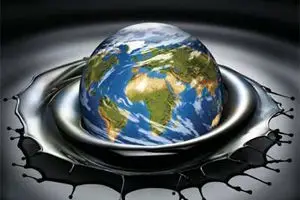We are used to hearing in the media from journalists and certain, wrongly called, environmentalists, harshly criticizing oil and fossil fuels. How polluting it is, how bad it is, accompanied by images of polluting chimneys and black clouds of smoke. This way of thinking has gradually permeated public opinion to the point that, paraphrasing the (bad) joke about tobacco, it seems that “oil killed my father and raped my mother”.
Do not get me wrong, I do not intend to sing the praises of oil lobbies, or encourage you to consume more oil. But these statements lose strength when they are made by someone with their latest generation smartphone, from the air-conditioned comfort of your room, and with a 200 hp car in the garage (or the desire to have it). We should not forget that, without a doubt, the society that we currently enjoy would not be possible without oil. All our technological advances, even those that will allow us to replace the use of oil in the future, cannot be developed without using it.
Let us not fall into the easy hypocrisy of thinking that oil is used solely for the benefit of powerful groups. Oil has exceptional characteristics that have made it so widely used. Its extraction is relatively simple. It has a huge energy density, both per unit of mass and per volume. Its storage is safe and does not require complicated facilities. It is easily transported and recharged quickly. To convert it into energy, all that is needed is to burn it. The equipment for this, engines and boilers, are simple and well known to our technology.
The biggest problem with oil, let’s not fool ourselves, is that it is running out. None of the available technologies meet all the necessary characteristics for its replacement, nor is it foreseeable that they will be able to do so for decades. But what is really dangerous is that we do not have data on the environmental consequences that these other technologies may have when they are massively implemented. Let’s see if, as is often said, the cure is worse than the disease.
You may be surprised, but when oil was discovered, it was considered an energy utopia. A substance that had stored solar energy for millions of years and that when burned only released H2O and CO2, exactly like living beings do. Both substances were naturally present in the atmosphere and were not considered pollutants. It was not until decades later, when its massification began to release tons of CO2, that concern arose about the effect of these emissions on the greenhouse effect and possible climate change.
It is necessary to carry out life cycle impact studies of possible oil substitutes, when they are used massively to meet global demand. We do not know the effect that the extraction of semiconductors for the generation of photovoltaic panels, as well as their recycling, can have. We do not know the impact of the extraction of materials, for example lithium, in sufficient quantities to produce enough batteries to power the global fleet of vehicles. We do not know the environmental impact of massively implementing wind turbines or solar power plants to meet our electricity demand. And the worst part is that we should not worry about the effects that we are currently able to calculate and quantify, but those that we still do not know and will discover after their implementation (as happened with CO2).
The problem with the environment and energy is not oil or fossil fuels, it is our disproportionate energy consumption. It is our need to change our smartphone for the latest model every one or two years. It is setting the thermostat to 21ºC in the summer and walking around the house in long sleeves. It is still watching people accelerate out of a traffic light in a “too fast too furious” manner, even when they see another red light 10 meters away. Perhaps this is the real guilt of fossil fuels. They put huge amounts of energy at our disposal and we have become accustomed to wasting it. We have become accustomed to a standard of living and technical characteristics of our machines that we are not willing to give up. We do not want a slower car, or one that accelerates more slowly, or with less autonomy.
It will not help us to think about a future of white, pristine cities, supplied with non-polluting technologies. Technologies that allow us to maintain our habits with zero impact on the environment. These technologies do not exist, and will never exist. Any technology we use will have an impact on the environment. This way of thinking only serves to deny our responsibility in the problem. It’s not my fault, for leaving the window open with the heating on. It’s “the ones at the top” fault, who do not want clean technologies to see the light.
So the next time we look for culprits about the state of the environment and the energy landscape. Or when you hear criticism of the role of oil and fossil fuels. Before we start looking for big conspiracies and shifting the blame to the pressure of big economic groups, I suggest as a self-criticism exercise that we all look in the mirror first. Me first.
